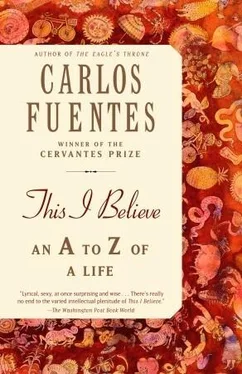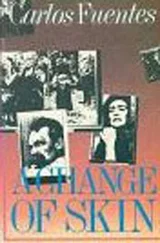We should not, however, turn a blind eye to the dangers— not so much the relatively minor danger presented by commercialization as promoter of fleeting trends and bad taste (something that has always existed) but rather the danger of abusing new technologies to make the inconclusive seem conclusive. In the human world, which has always been a world of necessity and chance, texts are necessary to make things intelligible — things that otherwise would lack meaning. This necessity, for example, may produce the Bible, but also Mein Kampf. Rudderless societies, ones in which material satisfactions leave the spirit unsatisfied, and where the unsatisfied grow tired of waiting, are the societies where the most dogmatic texts have most powerfully captured the attention and imagination of the masses. Just imagine what Hitler would have done with a television screen.
This is the danger. We live in a global village of mass communication, technical progress, and economic interdependence, but we can easily cultivate the fears and even the rebellion of the local village that does not see itself reflected in these media and which, like Tantalus, will try in vain to attain the fruits that the temptations of advertising emblazon on screens all across the planet.
An authoritarian capitalism, no longer facing a totalitarian Communist enemy, hovers as a dismal, vague threat in some parts of the world. It poses a threat not only to books and to reading, but to the free and creative use of audiovisual media. And the only way to neutralize this noxious effect is with a fully democratic order, a pluralistic political regulation of the use of these media and, above all, a political and social mandate to ensure that public education programs, public libraries, free textbooks, and the freedom for all creative expression meet the highest standards of availability, quality, and effectiveness.
Over the past century, in every Latin American country, we have all witnessed and participated in the creation of a great circle, a circle that travels from writer to editor to distributor to bookseller to the public and then back to the writer. Unlike what has happened in countries with more mercantile development but less intellectual stimulation, in Mexico and Latin America there are certain books that never disappear from the shelves. Neruda and Borges, Cortázar and García Márquez, Vallejo and Paz; they are always present in our bookshops.
They are always present because their readership is constantly being replenished, never depleted. These are young readers, between fifteen and twenty-five years old. They are men and women of the working class, middle class, or somewhere in between, carriers of the changes and the hopes of our continent.
Today, the succession of economic crises endured by Latin America since the 1980s is the greatest threat to the continuity of the reading tradition, which is a reflection of society’s continuity. Various generations of young Latin Americans have discovered who they are by reading Gabriela Mistral, Juan Carlos Onetti, or Jorge Amado. A break in this circle of reading would signify a loss of identity for many young people. Let us not condemn them to leave behind libraries and bookshops only to get lost in the subterranean realm of misery, crime, and neglect.
Let us not allow a single young reader-in-waiting to waste away in the limbo of the lost city, the slum, the marginal neighborhood, or the shanty town.
The library is an invaluable institution in the panorama I describe, because it allows us to witness, close up, the verbal riches of humanity, in a civilized environment and with a protective roof over our heads.
But once there, even when we are surrounded by beauty, peace, hospitality, and even the unique aroma of the library, we must never lose sight of the fact that the perils of censorship, persecution, and intolerance can still strike out against the written word. The fatwa against Salman Rushdie is a case in point.
In 1920, José Vasconcelos launched a literacy campaign that met with fierce resistance from the landowning oligarchy of the day. The hacienda owners did not want workers who could read and write; they wanted submissive, ignorant, dependable laborers. Many of the teachers Vasconcelos sent to the countryside were hanged from the treetops. Others returned mutilated.
Vasconcelos’s heroic literacy campaign was matched, with no contradiction whatsoever, by a parallel trend toward high culture. In 1920, as the dean of the Universidad Nacional de México (National University of Mexico), Vasconcelos ordered the printing of a collection of beautifully bound volumes of Homer and Virgil, Plato and Plotinus, Goethe and Dante — a collection of true bibliographical and artistic jewels. But for a population of illiterate, indigent, marginalized people? Yes, precisely: the publication of these classics at the university was an act of hope. It was a way of saying to the majority of Mexicans: one day you will be at the center, not the margins of society. One day you will have the resources to buy a book. One day you will be able to read and understand those things that now, in our day, all Mexicans understand.
Let the book, even as it is being commercialized, transcend commerce.
Let the book, even as it competes in the contemporary world with the abundance and ease of the information technologies, stand as something more than just a source of information.
Let the book teach us all the things pure information does not: a book teaches us to extend simultaneously our understanding of ourselves, of the objective world outside of ourselves, and of the social world where the city (the polis ) and the human being (the person) come together.
The book shows us something that no other form of communication is able, willing, or equipped to show us: the complete integration of our faculties for understanding ourselves so that we may become fully realized people in the world, both within ourselves and with others.
The book tells us that our lives are a repertory of possibilities that transform desire into experience and experience into destiny.
The book tells us that the Other exists, that others exist as well, that our persona does not exist in and of itself but has a compelling moral obligation to pay attention to others, who are never superfluous to our lives.
The book is the education of the senses through language.
The book is tangible, olfactory, tactile, visual, an act of friendship that opens the doors of our respective homes to the love that unites us with the world, because we share the verb of the world.
The book is the intimacy of a country, the inalienable notion we create of ourselves, of our time, of our past and our remembered future, experienced throughout the ages as verbal memory and desire in the here and now.
Now, more than ever before, a writer, a book, and a library give a name to the world and a voice to the human beings in it.
Now, more than ever, a writer, a book, and a library tell us: if we do not give things names, nobody will give us one. If we do not speak, silence will impose its dark sovereignty upon us.
As part of a survey to commemorate the start of the twenty-first century, The New York Times asked me the following question: in my opinion, which revolution was the greatest of the millennium?
A difficult question to answer for many reasons, the first being the ambiguity or polyvalence of the term “revolution” itself, which contains an element of rupture as well as return. The revolution of a planet refers to the manner in which a heavenly body returns to its point of origin. But the revolution of a society is the exact opposite. It refers to a rupture in the established order and a movement toward a future, hopefully a better one.
Читать дальше












